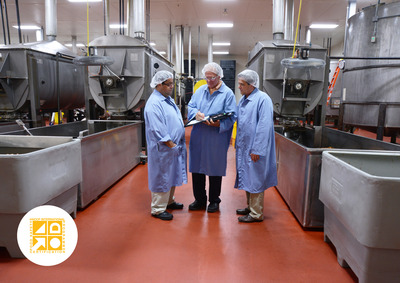Contact Details:
Flowcrete
176 Voortrekker Street
Jacobs
Durban
Kzn
4052
South Africa
Tel: +27 (0)31 461 3411
Fax: +27 (0)31 461 3475
Send Enquiry | Company Information

Flowfresh Floors Attain HACCP International Certification
Company News Monday, August 10, 2015: Flowcrete
This certification, which applies to Flowcrete South Africa’s Flowfresh range, means that food and beverage producers across Africa that are operating a Hazard Analysis and Critical Control Point (HACCP) based food safety programme can specify flooring materials - safe in the knowledge that they will meet the relevant regulatory authority’s standards for safe procurement, production and processing as well as the requirements of the world’s leading quality and food safety standards.
HACCP International certification is a globally recognised benchmark of food safety, and as such is an important set of criteria for businesses eager to gain access to lucrative export markets.
Flowcrete Group’s Technical Director, Grant Adamson, said: “Our polyurethane range has been able to achieve the HACCP International certification thanks to its ability to deliver a long list of strict food industry flooring requirements.
“To provide food manufacturers with a floor that goes above and beyond the highest food safety standards, we’ve created Flowfresh out of an exclusive global partnership with the antimicrobials manufacturer Polygiene®. A silver-ion based bactericidal additive is added into the Flowfresh material, empowering the floor finish with the ability to eliminate up to 99.9% of bacteria in contact with the coating.”
Flowfresh has also been proven to meet the ISO 22196 standard, which measures a surface’s antibacterial effectiveness. The polyurethane system underwent rigorous testing to show that it complied with this internationally recognised benchmark of quality.
The Polygiene® agent is homogenously distributed throughout the Flowfresh finish. This formulation means that should the coating ever chip, then any contaminants that fall into that space will still be exposed to the bacteria killing flooring ingredient.
The floor plays a crucial role in addressing contamination risks, as an inadequate finish can become a prime site of bacteria build-up. Not only does the floor have to provide a hygienic surface, it needs to do so in the face of corrosive chemicals, moisture, impacts and thermal shock. If it cannot withstand these conditions then the floor can quickly fail – leading to germs and pathogens infiltrating hard to clean cracks.
HACCP guidelines state that a seamless and impervious finish must be maintained at all times, even when subjected to a large-scale food processing facility’s intense working environment. Flowfresh has been specifically formulated to provide a surface that will comply with food industry regulations for an extended period of time despite the sector’s inherently challenging conditions.
To meet the HACCP International standard, floors also need to allow for adequate drainage and cleaning. A Flowfresh coating can be laid to falls and incorporate stainless steel drainage to effectively channel contaminants and excess liquid out of the area. Coving can also be incorporated to create a seamless, easily cleanable transition to the wall and even the floor’s texture can be tailored to best suit the on-site cleaning regime.
HACCP management systems help safeguard facilities from such things as spoiled produce and tainted equipment while protecting consumers from outbreaks of foodborne illness, a potentially fatal circumstance that can have serious financial and reputational repercussions for the manufacturer.
A seamless, high performance polyurethane finish will also prevent common food industry by-products like fats, acids, blood and oils from seeping into the underlying concrete and damaging the substrate.
Get in touch with Flowcrete South Africa today to find out more about how Flowfresh can help food and beverage facilities meet regulatory requirements and protect against the threat of bacterial contamination.
